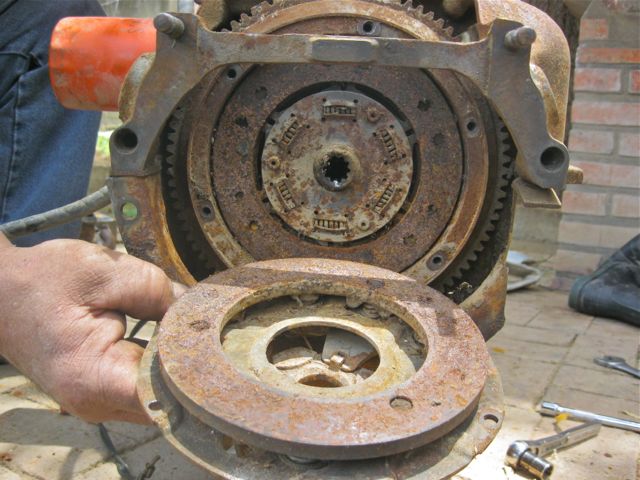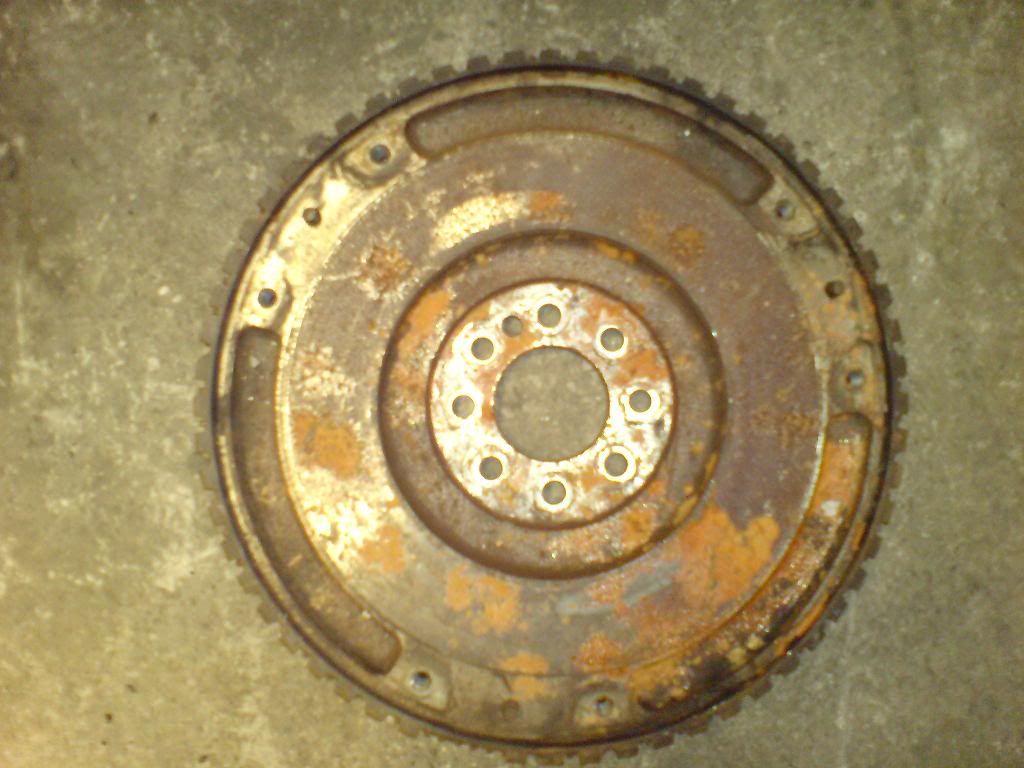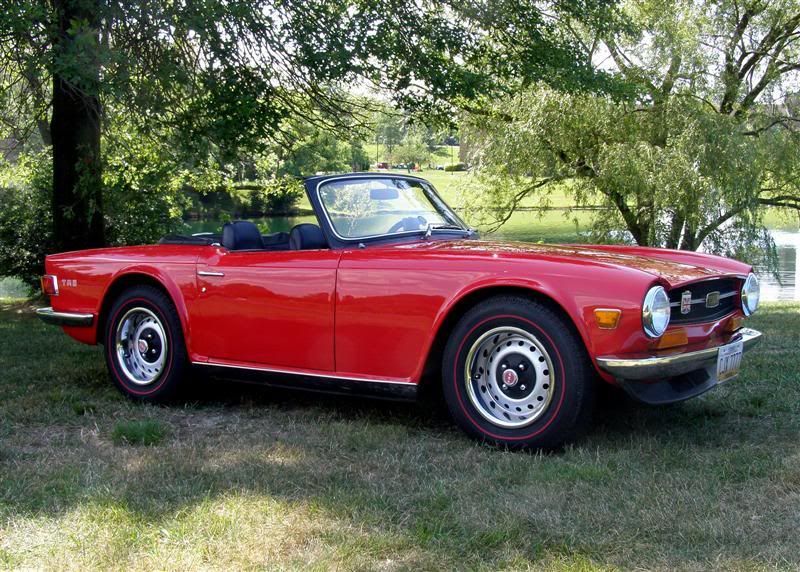Automobile Enthusiasts
Related: About this forumUmmm.... my clutch grindeth
I have a '78 MGB with a custom high-performance engine (about 30,000 miles ago) and at that point I put in an overdrive transmission. It's worked perfectly. I recently stored it in my garage for the winter, though on a warm(er) I day I try to start it up. Suddenly it grinds like hell trying to go into reverse (never actually goes), and it's impossible to get it into any other gear (although those don't grind, they just don't work).
On the few times I've lost the clutch on other cars in the past it's been gradual process, but this seems different. Could there be something else going on?
Thanks
- Tab
Turbineguy
(38,786 posts)The master cylinder is next to the brake master and the slave cylinder is next to the clutch on the left side. The small cylinder is an easy and cheap overhaul. Not really a good choice of terms those.
Tab
(11,093 posts)Thanks for the insight!
- Tab
Mopar151
(10,221 posts)If not, refilling and bleeding may buy you a day or 2 - or confirm where the fluid is going. In most cases, the clutch slave is the culprit - corrosion in the bore has met abrasion of the seal. Rebuilding is generally an exercise in futility, and new ones are cheap anyway.
BobUp
(347 posts)as an example, what do you suppose happens to disc brake rotors and the brake drums on cars when the cars or trucks are stored for a period of time? They rust. What has occurred is rust on the flywheel and the metallic parts of the clutch disc. You might need to remove the trans and bell housing and sandpaper-emory cloth the flywheel. If you installed a clutch disc with metallic engrained into the disc, you might need to replace that. Also, the pressure plate springs and fingers probably have a good coating of rust on them too.
People should never, ever "store" a vehicle, vehicles are meant to be driven. At least once in awhile, go start the vehicle, drive it til it gets fully warmed up, put fresh gasoline in it with Stabil, and just keep things flowing.




Tab
(11,093 posts)Storage is not the problem here, because I was driving it constantly over the summer with no troubles and only put it in the garage two weeks ago. I agree storage creates other problems, but likely not the one I'm seeing here.
Gold Metal Flake
(13,805 posts)Either the clutch master cylinder or the slave is bleeding pressure around aged seals or you need to top off your fluid.
Here is a link to a very good MGB forum:
http://www.mgexp.com/phorum/list.php?1
ConcernedCanuk
(13,509 posts).
.
.
Check clutch (slave cylinder pushrod) adjustment, fluid level, and for any signs of leaks - would be damp around the slave cylinder on the side of the tranny housing.
Bleeding the air from these systems is a bugger - found a site that explains it fairly well
here's a link -->> http://www.mg-cars.net/mgb-technical-bbs/clutch-problems-wont-shift-into-any-gear-200808032048296648.htm
I doubt that the clutch itself is defective or excessively worn - worn out clutches just won't move the car, or start slipping on hard acceleration before they give up the ghost completely.
Your usage and storage habits suggest to me that there is not a reasonable indication of a clutch seized to it's pressure plate -
I do believe that your problem is within the hydraulics - leakage or adjustment.
My qualifications? - I am an Interprovincial Licenced Auto and Truck Mechanic (retired) in Ontario, got my papers in '75, started 'playing" with cars in '68 - I been around . . .
CC
Tab
(11,093 posts)but it made for a good title.
You don't live in Northern New England, do you? ![]()
ConcernedCanuk
(13,509 posts).
.
.
Anyhoo -
I owned an old Vauxhall with a hydraulic clutch system - it had a leaking slave so I was constantly adding fluid until I repaired it.
One time before I repaired it I experienced your problem while on a trip, and without fluid or tools -
SO
I started it in first gear, and shifted without the clutch to get home (truckers don't usually use the clutch after first gear anyways - that's how I learned to shift without the clutch).
I'm not recommending this tho -
I suppose trying to find a mechanic who knows what they're doing with older vehicles is hard to find - they sure are rare up here. Most mechanics I know now can't figure out a damm thing unless they can plug it into a computer!
I got a "referral" from a neighboring garage over a decade ago because the mechanic there knew squat about carburetors - I was rebuilding carbs in the 70's - from 4bbl high performance to Bosch/SU single barrel carbs (mostly Volvo and MG).
Guy's car was smoking like crazy and gobbling gas - choke linkage stuck - 5 minute fix . . .
Good luck in your search for a mechanic that can help you out -
Question - do you do any of your own mechanical work?
Most do not, but if I can help with advice to do it yourself, I can do that.
After being in the trade for over forty years, my opinion of most mechanics is not complimentary.
In my opinion, there are more bullshitters in the mechanical trade than any other.
I figure you are aware of that, ergo the online search for assistance.
CC
ps: Mattawa is 45 miles East of North Bay which is about 200 some miles north of Toronto.
Tab
(11,093 posts)I do SOME of my mechanical work. I obviously don't do anything I need major equipment for (e.g.: suspension or steering rack) or that might affect the safety of the car (but I did replace the master brake cylinder).
I'll have to wait for a warm day. The car is parked forward-facing into the garage - I'll probably have to put it in neutral and push it out.
I'm lucky enough to have one local mechanic who, although they don't specialize in MGs (they do all cars) at least do a decent amount of work on older cars and have tuned it for me, got the carbs clear, made it hum.
When it gets warm enough (which might just be in a few weeks) I'll push it out and try to put some fluid in there. The next trick is to see if it STAYS in there or if I have a leak somewhere.
Thanks
- Tab
JohnnyRingo
(19,691 posts)But if you put fluid in the clutch cylinder or the brake master you should read my reply below. Never use Dot3 in a British car.
Tab
(11,093 posts)What does it take, then?
JohnnyRingo
(19,691 posts)It's likely that when the OD was installed the mechanic used Dot3 in the master cylinder, the same as he would a Chevy or Ford. It doesn't take long at all for the incorrect fluid to attack the unique natural rubber seals used in all British Leyland cars and turn them to goo.
This is evidenced by looking at the fluid in the reservoir and seeing if it's clear. If it's cloudy black, that's the rubber being dissolved into the Dot3 fluid. Only Dot4 is acceptable in your car. Not Dot5 or silicone mind you, but regular Castrol Dot4 brake fluid available in most any parts store.
The same applies for the brake system. If you added any Dot3 to the brake master cylinder, get it out now before it gets to the four wheel cylinders, costing you even more money. If you have access to a fluid pump (they're about $15), suck the remnants of the contaminated fluid out and bleed the brakes anew after the Dot3 is completely purged from the system.
As I mentioned, a rebuild is pretty straightforward and easy enough for a backyard mechanic. It involves only removing the piston, cleaning up scores with emery cloth, honing the cylinder with a cheap hone attached to a drill, and replacing the rubber seals included in the kit. The unnecessary cost of new hydraulic cylinders for British cars can cause sticker shock on a par to a heart attack.
A good friend of mine owns a great local auto recycling shop here in NE Ohio. Team Triumph specializes in hard to find British car parts. His warehouse has a garage door at one end, and as a junk Triumph or MG proceeds down the disassembly line, it disappears into the racks and is gone completely by the time it reaches the end. His extensive supply vintage inventory is legendary among the community, with customers as far away as Europe and Australia.
Scott Harper has been doing this for almost 25 years, and he is a walking encyclopedia of British car knowledge. When you call there, it's Scott himself who answers the phone (tell him I said hi). He and his right hand man Denny also get their hands dirty tearing down cars, cleaning parts, and packing parts for the UPS truck that arrives twice a day. He's very honest, fair, and he discounts most Moss motors parts 10%, possibly including your rubber seal kits for the master & slave cylinders. As a plus, he's a devout liberal democrat whose daughter works for the national party.
I strongly suggest you call Scott for all your future MGB parts needs. Here's his website with all pertinent contact info:
http://www.teamtriumph.com/
Good luck, and let me know how your project goes.
JohnnyRingo
(19,691 posts)Last edited Tue Jan 21, 2014, 08:44 PM - Edit history (1)
It goes in a small round cylinder on the firewall near the brake master cylinder.
I've owned Brit cars for decades, and they use natural rubber seals in their master, wheel, and clutch cylinders. If you add Dot3 brake fluid to the system, you'll turn those seals to jelly in a matter of weeks. Dot4 (not silicone) fluid is the only type acceptable for British cars. You can tell if the wrong fluid was added because Dot3 causes the fluid to turn from clear to a murky black as the rubber seals melt away.
Earlier posters are correct that your car has a hydraulic clutch and that being the likely problem, but they are wrong about it being cheaper to replace than rebuild on a British car. The master and slave cylinders are easily rebuilt with a $30 seal kit available from Moss Motors. All traces of Dot3 must be cleaned out of the system. The clutch slave cylinder is easily spotted and removed on the bell housing.
If you added Dot3 fluid to the brake system, you can soon expect a total pedal failure soon as well, but with so many wheel cylinders, it gets much pricier to purge & rebuild. Don't be afraid to attempt to rebuild a hydraulic cylinder on an MG, it mostly involves replacing the natural rubber O-rings and light honing with emery cloth. There are only two parts to each cylinder so assembly is a snap. I think instructions are included with a rebuild kit.
Once again, if you added Dot3 to the brake master, get it out now. Do not let that contaiminated fluid reach the four wheel cylinders. If you have any questions, I'll be glad to help.

Eleanors38
(18,318 posts)If fluid has leaked out enough, you will feel a significantly "softer" pedal which cannot throw the clutch. I recommend rebuilding Both cylinders, using Dot 4 for both cleaning & rebuilding.
I assume this car has not gone over to aluminum replacement parts; if so, dont try to hone or scratch off burrs and deposits as aluminum bores are highly polished. Shouldn't be the case with MGs, but numerous imports do use aluminum. Good luck!